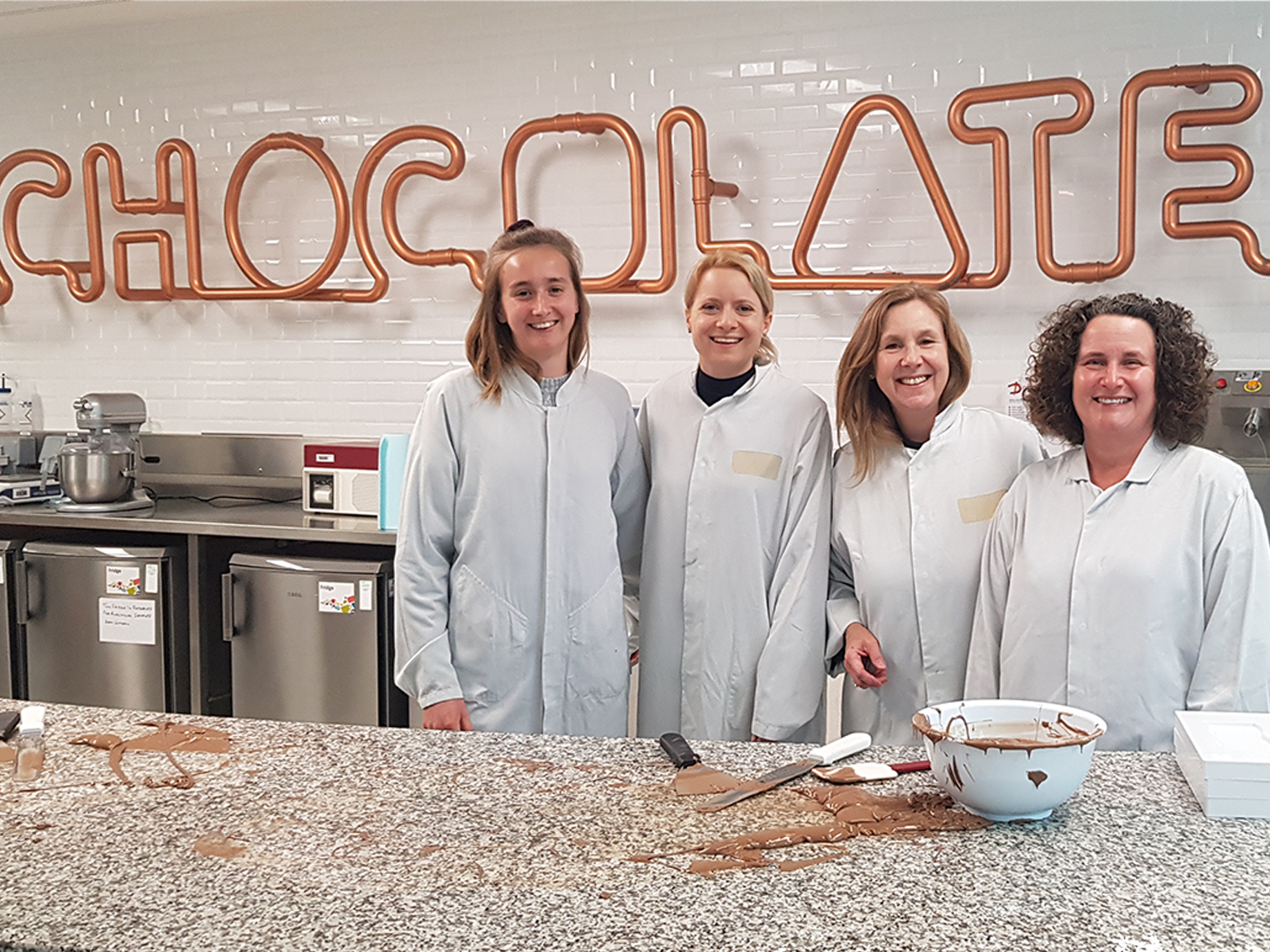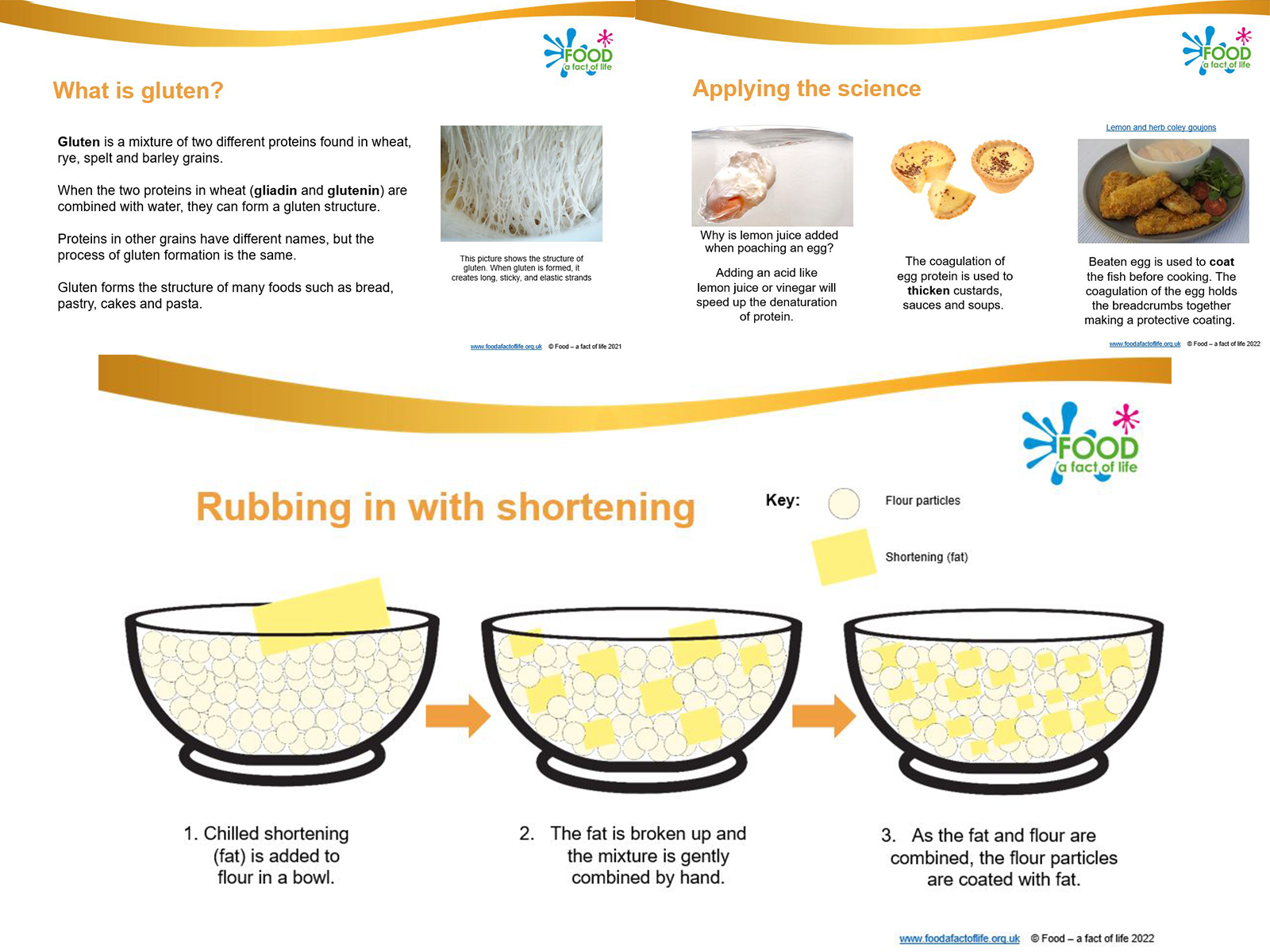Outreach that reaches all
Scientific outreach doesn’t always have to be big bangs, dry ice and coloured foam stuck to the ceiling. Although these activities are undoubtedly fun and memorable for schoolchildren, we are proud to be part of a more considered movement in outreach to encourage children – and particularly those from less advantaged backgrounds – into the profession.

Chocolate tempering with Kate Rose, apprentice food technologist at Mondelez, alongside Dr Stacey Lockyer, Elaine Hindal and Frances Meek from the British Nutrition Foundation. Picture: Frances Meek
In November 2020, we launched the results of an unprecedented five-year research project into outreach at schools called Chemistry for All. Specifically, it set out to explore barriers to participation in UK chemistry undergraduate study, and establish how outreach activities affected them.
Annual survey and interview data were collected from two student cohorts in 23 schools across the country, with outreach provided by Nottingham Trent University, LJMU and a partnership of the Universities of Reading and Southampton. Data was collected by researchers at UCL Institute of Education, and included evaluating the attitudes of 6,367 students.
Of these students, 29.5% had increased confidence in doing science/chemistry due to outreach activities; 29.9% increased their knowledge of the benefits of a career in science/chemistry; while 30.8% increased their understanding of how science/chemistry relates to everyday life.
The project concluded that, while traditional outreach may have positive benefits for some students, it is not targeted to be optimally effective for those from less advantaged backgrounds. Careful programme design can support more students from homes with lower levels of science capital – i.e. where students are less likely to grow up with informal science activities and role-models with knowledge of or careers in science – to consider chemistry as a career choice.
Particularly successful outreach often showed how chemistry is useful for getting a future job. It helped students to understand the world around them, built students’ confidence, and showed them that ‘people like me’ belong in chemistry. For students from less advantaged backgrounds, the most effective outreach took the form of contact with relatable role models, experiments and advice that related to real-life applications of chemistry and was incorporated into lessons during school hours.
Putting learnings into practice
Based on the range of insights from the study, we launched the Chemistry for All Outreach Grants – grants of up to £25,000 available to outreach providers who can put the lessons learned into practice and build upon the research. Eight grants were finally awarded from 18 applications, and we have commissioned an independently managed evaluation to continue the research.
One grant was won by a team at the University of Strathclyde to run their Chemistry for Students-Teachers-Employers-Parents programme – otherwise known as ChemSTEP. Its team members are Professor Debra Willison, Dr Fraser Scott, Dr Sarah Walker, and Roslyn Nimmo.
Dr Fraser Scott, senior lecturer, explained that their project was born of a desire to broaden participation in chemistry – predominately from students in inner-city Glasgow: “We recognise that there are lots of opportunities out there for more privileged students to access careers information. We are trying to help form those links for less privileged students within Glasgow and the west of Scotland by reaching out to our established network of industry contacts to showcase the diversity in careers and people within the chemical sciences. We’re doing this by creating vlogs (video blogs) of scientists, to be used in schools to provide context for careers and show real people doing real work. We think this is important right down to primary school level, as we are coming to realise that the earlier you provide careers-related information the better – not so much selling them careers but making sure they aren’t put off because they don’t see themselves represented.”
Dr Sarah Walker, teaching fellow at the University of Strathclyde, added: “Those from low socioeconomic backgrounds often don’t have the scientific social capital to draw on. If the parents don’t have higher education experience they may not have as much knowledge of the variety of careers available, and may not have the same networks who can provide advice. Part of our work – and where we also hope a digital format will help – is to engage parents as well. For various reasons, it can be a challenge getting engagement in career discussions from our target audiences, so we also plan to time our work with when students have to pick subject choices, alongside designing reflective activities for use in-class that can start conversations between students and their parents at a time when everyone is more invested in these topics.”
Since starting the project the team have collated a set of vlogs from five practising chemists across a range of chemical science careers, each producing five videos targeted at secondary education and one for primary schools. Dr Scott said: “We’re looking at having around ten case studies for the programme’s first iteration. We will trial them, evaluate them properly – and then once that is completed we will make them freely accessible to all teachers on a website. But it’s very important to test them first.”
Dr Walker said: “Students, teachers, employers and parents will all be able to access materials digitally tailored for the audience, and this will also link to relevant career information – such as that provided by the RSC – and also relevant upcoming events. We have ensured our case studies showcase industrial chemists at various points in their career and include examples of those going through apprenticeship routes alongside the university degree-based routes that are more often communicated to students. We are also profiling Scottish-based participants at international companies to show that travel is also an option in future careers.”
Dr Scott said: “The big finding we took away from Chemistry for All were that teachers have barely any time, so you have to design outreach that is almost effortless, and can be incorporated during class time – so the logistics of the approach to our project was informed by the research. Alongside our in-class activities, we’re now trying to tap into networks and events that are already happening, facilitating local industries to engage with schools’ existing approaches to career education, rather than organising additional events that schools perhaps don’t have time for.
“The highlight for me so far is that we’ve been able to connect a school and a company that are practically on the same street, but would otherwise not have engaged with one another. That’s quite eye opening – these opportunities are there but need a catalyst. The ChemSTEP project is about helping schools, particularly those with a high proportion of students from low socioeconomic background, to make these connections.”
Starting from scratch
One of our grant holders – The British Nutrition Foundation – has used the opportunity to start their first outreach programme aimed at students from 11-14 years old, called pHood Futures. Education services manager Frances Meek said: “When we first heard about Chemistry for All and the grants, we were really excited, because it seemed an ideal fit for a lot of our resources – which are around the context of food such as nutrition science, the function of ingredients and also from a sensory science perspective. Encouraging teachers and students to relate their general day-to-day experiences of food to science seemed a fantastic way of showing careers in science are accessible to everyone.

Examples of classroom resources for teachers. Picture: British Nutrition Foundation
“I think the area of food science is very much one of the more accessible careers options related to chemistry, but the issue is people just don’t know about it. If you were to ask a young person what careers there are in food, they would say maybe a chef or a barista – and these careers are very worthwhile – but we really want to get the message across that from field to fork there are some fantastic things that young people can be doing: from farming, agriculture and animal husbandry to soil science, nutrition and product manufacturing.”
The pHood Futures programme includes webinars, recruiting ambassadors to go into schools from their wide range of industrial contacts, and a ‘food science pack’ to be provided to teachers.
Meek said: “The food science packs are PowerPoint presentations that explain to students a principle of food science such as shortening – fats used in in making pastry and scones, for example – to get the students interested in the kind of things they could make and develop an understanding of ‘the appliance of science’. And the latter part of the presentation is for the teachers themselves to get them up to speed and links to resources they can use as standalone activities.
“One of the findings that we noted from Chemistry for All was to make it available to all pupils rather than a select few so we have provided resources that can be used in the classroom during lessons. We also noted that there were certain cohorts within schools less likely to study science further on – but rather than focus purely on these groups we wanted to make them accessible for everybody to try and make it more likely the resources are used in our target schools. We have given schools the option to use the resources in small groups, though – and that’s a result of the finding that teachers should be included in the design of outreach at an early stage. We’ve said to the teachers ‘we won’t tell you what to do with the programme – you let us know what you need, and we will help you run it in the way you want to run it that works best for your schools and pupils’. Particularly when working with schools in less advantaged areas, which may already be involved in a wide range of programmes, we want to make it that being involved doesn’t feel it could be a step too far.
“I’m very pleased with the progress we have made so far. We already have teachers using our resources to make cheese during summer activities week, and I’ve got a wonderful young apprentice food technologist called Kate Rose who is going to do a session on chocolate tempering for us. She was so enthusiastic and knowledgeable. She’s worked for Mondelez International since she was 17 and is now completing an apprenticeship degree and I just know she will be a hit. Students learning from someone relatable and passionate about a food everyone loves – what’s not to like?”
Similar to the University of Strathclyde, the British Nutrition Foundation are looking at making their resources digitally available to expand their reach. Meek said: “We want to make our resources available to all teachers across the UK – any learning, training and contacts will also be made available to schools UK-wide. Although we’re not a careers organisation we are very passionate about helping young people consider careers in the world of food and understand the context of what they eat. We don’t anticipate this project ending when this grant ends – we want to work with other partners and other corporate organisation to make it continue.
“From a personal perspective when my children went to school, I remember that outreach was always targeted at the more advantaged students who were already on their way to university and I just thought it was wrong – both as a parent and as a teacher. I really hope that the work we are doing is helping provide support in new and different ways.”
You can read our Chemistry for All research here – if you are designing an outreach programme and would like our support in understanding our findings further get in touch.